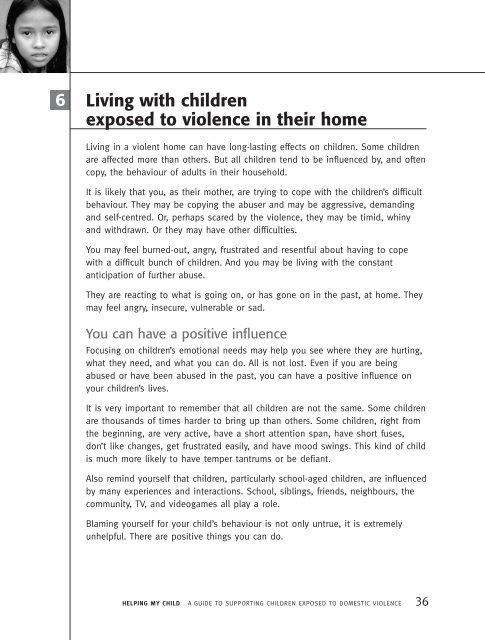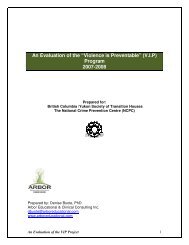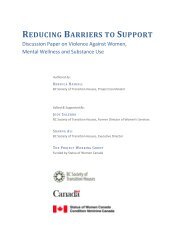a guide to supporting children exposed to domestic violence
a guide to supporting children exposed to domestic violence
a guide to supporting children exposed to domestic violence
You also want an ePaper? Increase the reach of your titles
YUMPU automatically turns print PDFs into web optimized ePapers that Google loves.
6<br />
Living with <strong>children</strong><br />
<strong>exposed</strong> <strong>to</strong> <strong>violence</strong> in their home<br />
Living in a violent home can have long-lasting effects on <strong>children</strong>. Some <strong>children</strong><br />
are affected more than others. But all <strong>children</strong> tend <strong>to</strong> be influenced by, and often<br />
copy, the behaviour of adults in their household.<br />
It is likely that you, as their mother, are trying <strong>to</strong> cope with the <strong>children</strong>’s difficult<br />
behaviour. They may be copying the abuser and may be aggressive, demanding<br />
and self-centred. Or, perhaps scared by the <strong>violence</strong>, they may be timid, whiny<br />
and withdrawn. Or they may have other difficulties.<br />
You may feel burned-out, angry, frustrated and resentful about having <strong>to</strong> cope<br />
with a difficult bunch of <strong>children</strong>. And you may be living with the constant<br />
anticipation of further abuse.<br />
They are reacting <strong>to</strong> what is going on, or has gone on in the past, at home. They<br />
may feel angry, insecure, vulnerable or sad.<br />
You can have a positive influence<br />
Focusing on <strong>children</strong>’s emotional needs may help you see where they are hurting,<br />
what they need, and what you can do. All is not lost. Even if you are being<br />
abused or have been abused in the past, you can have a positive influence on<br />
your <strong>children</strong>’s lives.<br />
It is very important <strong>to</strong> remember that all <strong>children</strong> are not the same. Some <strong>children</strong><br />
are thousands of times harder <strong>to</strong> bring up than others. Some <strong>children</strong>, right from<br />
the beginning, are very active, have a short attention span, have short fuses,<br />
don’t like changes, get frustrated easily, and have mood swings. This kind of child<br />
is much more likely <strong>to</strong> have temper tantrums or be defiant.<br />
Also remind yourself that <strong>children</strong>, particularly school-aged <strong>children</strong>, are influenced<br />
by many experiences and interactions. School, siblings, friends, neighbours, the<br />
community, TV, and videogames all play a role.<br />
Blaming yourself for your child’s behaviour is not only untrue, it is extremely<br />
unhelpful. There are positive things you can do.<br />
HELPING MY CHILD A GUIDE TO SUPPORTING CHILDREN EXPOSED TO DOMESTIC VIOLENCE 36






